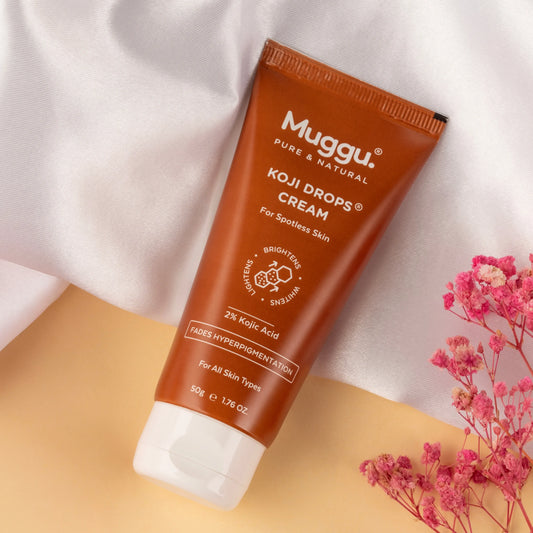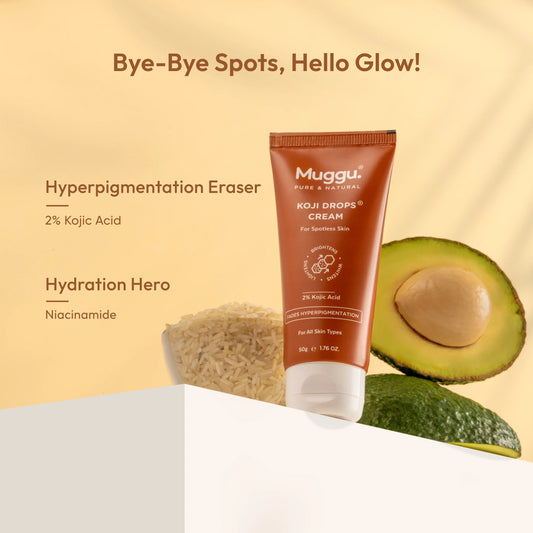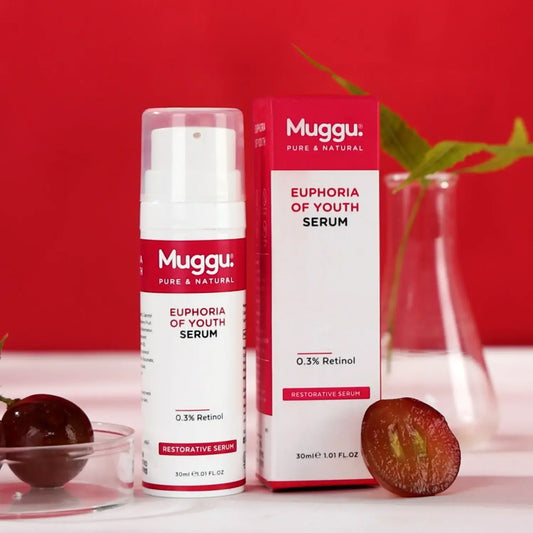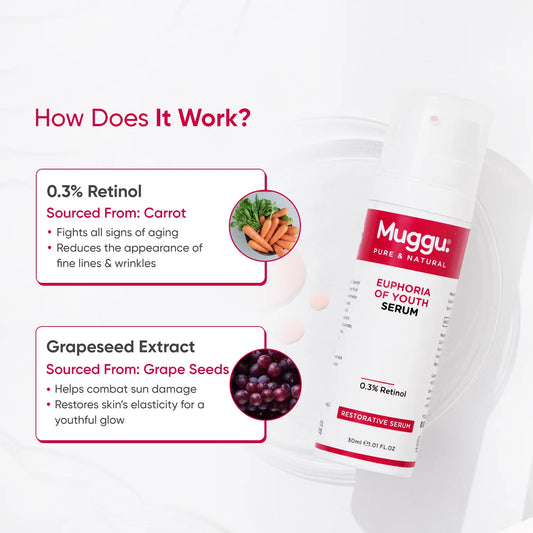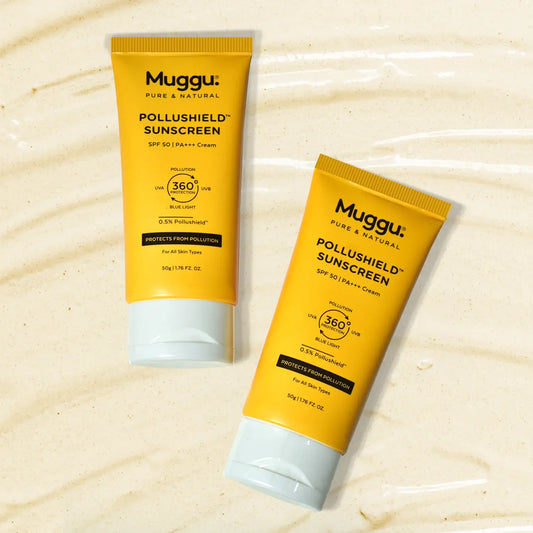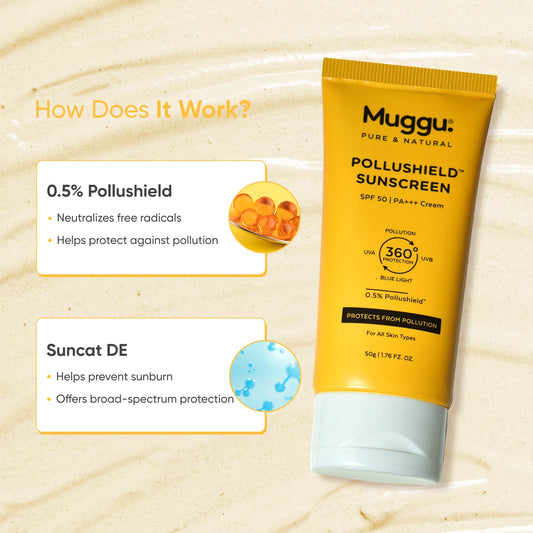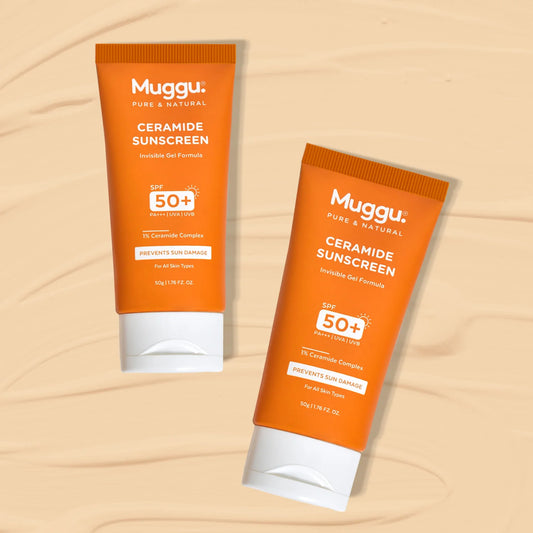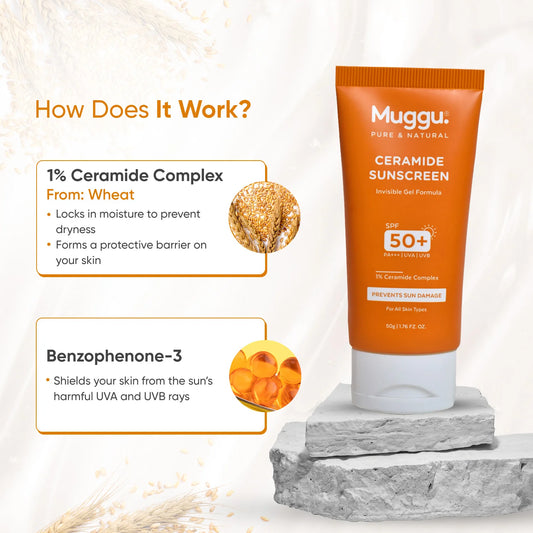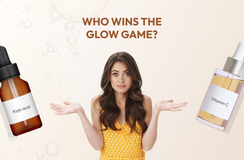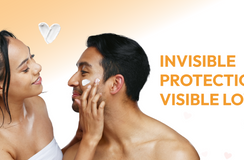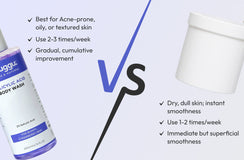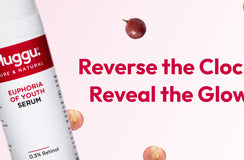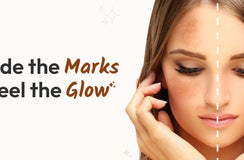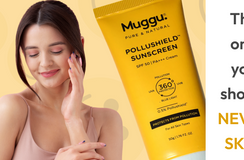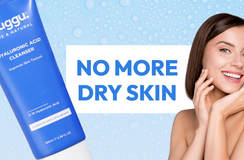For years, the sunscreen conversation in India has centered around SPF numbers — 30, 50, or 70 — but very little attention has been paid to how the sunscreen feels or performs in real Indian conditions: heat, humidity, pollution, and daily screen exposure.
The truth is, most people skip sunscreen not because they don’t know its importance — but because it feels uncomfortable, greasy, or leaves a white cast.
So, which sunscreen truly feels better on skin without compromising protection?
Let’s look at Muggu’s Pollushield™ and Ceramide sunscreens, and see how they differ from conventional SPF products — through a clinical, formulation-based comparison.
|
Parameter
|
Typical SPF Cream
|
Muggu Pollushield™ / Ceramide SPF 50
|
|
Protection Focus
|
UV only
|
UV + Blue Light + Pollution
|
|
Texture
|
Thick, sticky
|
Lightweight lotion / gel
|
|
White Cast
|
Common
|
None
|
|
Skin Barrier
|
Neutral / drying
|
Strengthening
|
|
Urban Protection
|
Absent
|
Active anti-pollution layer
|
|
Ideal For
|
Short outdoor exposure
|
Daily urban wear
|
|
Dermatologist Suitability
|
Limited
|
Suitable for sensitive & oily skin types
|
1. The Real Problem with Conventional Sunscreens
Most sunscreens in the Indian market (both local and imported) are optimized for UV protection — but not necessarily for comfort, pollution defense, or skin compatibility in Indian weather.
Here are the most common issues dermatologists report with generic SPFs:
-
Heavy, occlusive textures: Formulations rich in silicones or waxes block pores and feel greasy in humidity.
-
White cast: Common in mineral sunscreens containing titanium dioxide or zinc oxide — especially noticeable on medium to dark Indian skin tones.
-
No pollution or blue light protection: Conventional SPF filters only block UVA/UVB, not HEV (blue light) or particulate pollution.
-
Barrier disruption: Repeated use of alcohol-heavy or drying sunscreens can weaken the skin barrier, leading to sensitivity and dullness.
This gap in formulation science is exactly what Muggu Skincare set out to solve with India’s first Pollushield™-based sunscreen system.
2. What Makes Muggu Different: A Look at the Science
Unlike traditional SPFs that rely solely on UV filters, Muggu Pollushield™ Sunscreen SPF 50 PA+++ integrates environmental defense actives — a hybrid of UV protection + pollution neutralization + blue light filtration.
Here’s what’s inside and how it works:
Pollushield™ Complex (Patented Ingredient)
-
Function: Forms an invisible molecular film on the skin surface, preventing fine dust, heavy metals, and particulate pollutants from binding to the skin.
-
Clinical Insight: Independent in-vitro studies show that Pollushield™ reduces pollutant-induced oxidative stress markers by up to 74%.
-
Why It Matters for Indians: In cities like Delhi, Mumbai, and Bengaluru, PM2.5 pollution levels are among the highest globally. These particles accelerate pigmentation, dullness, and premature aging — issues that traditional sunscreens do not prevent.
Broad-Spectrum UV Filters
Blue Light Protection
3. The Texture Factor: Why “Feel” Is a Clinical Advantage
A sunscreen’s texture isn’t just about comfort — it determines compliance.
According to a 2022 study published in the Indian Journal of Dermatology, 72% of respondents admitted skipping sunscreen because of its greasy texture or white cast.
Muggu’s Formulation Response:
-
Pollushield™ Sunscreen: Lightweight lotion texture that absorbs instantly, leaving a soft-matte finish suitable for oily and combination skin.
-
Ceramide Gel Sunscreen: Water-based gel infused with ceramides for barrier repair and hydration — ideal for dry, sensitive, or aging skin.
Both variants are non-comedogenic, non-greasy, and free from zinc oxide or titanium dioxide, ensuring no white cast — a key comfort factor for Indian tones.
4. Ingredient-Based Comparison: Muggu vs. Common Sunscreens
|
Feature
|
Muggu Pollushield™ SPF 50
|
Muggu Ceramide Gel SPF 50
|
Typical Sunscreen in Market
|
|
Active Filters
|
Suncat DE (UVA/UVB encapsulated filters) + Pollushield™
|
Suncat DE + Ceramide Complex
|
Zinc oxide / Avobenzone / Oxybenzone
|
|
Blue Light Protection
|
✅ Yes
|
✅ Partial
|
❌ No
|
|
Pollution Shield
|
✅ Yes (anti-pollution film)
|
⚪ Mild
|
❌ No
|
|
Texture Type
|
Lotion (matte, breathable)
|
Gel (hydrating, invisible)
|
Creamy / thick
|
|
Barrier Support
|
✅ Strengthens with antioxidants
|
✅ Rebuilds with ceramides
|
⚠️ Often stripping (alcohol-based)
|
|
White Cast
|
❌ None
|
❌ None
|
⚠️ Visible (especially on brown skin)
|
|
Photostability
|
✅ High (Encapsulated system)
|
✅ High
|
⚠️ Moderate
|
|
Dermatologically Tested
|
✅ Yes
|
✅ Yes
|
Varies
|
|
pH-Balanced
|
5.5
|
5.5
|
Often unbalanced
|
From a formulation perspective, Muggu’s sunscreens combine the comfort of daily wear with clinical-grade defense, something missing in most SPF 50+ creams sold locally.
5. Evidence From Dermatology: Ceramides and Barrier Repair
A 2024 clinical trial by Yu Cao et al., published in the Journal of Cosmetic Dermatology (Vol 23 Issue 2, pp 525–528), evaluated 60 volunteers, including those with sensitive skin, who applied a ceramide-containing SPF 30 sunscreen daily for 4 weeks.
Key measurable outcomes were:
-
Transepidermal Water Loss (TEWL): ↓ 22.96% — indicating stronger barrier integrity
-
Skin Hydration: ↑ 21.96% in stratum corneum moisture
-
Redness / Erythema: ↓ 11.89% (a* value) and ↓ 5.68% (EI index)
-
Adverse Events: 0 reported
Conclusion: Daily use of ceramide-containing sunscreen significantly improved hydration and barrier function while reducing facial redness, without irritation.
These findings validate Muggu’s formulation logic — combining UV protection with ceramide support isn’t just gentler; it’s clinically beneficial for barrier health.
6. Pollution, Blue Light & Indian Skin: The Overlooked Trio
Indian skin, with higher melanin content, reacts differently to environmental stressors.
While it’s more resilient against UV-induced burns, it’s more prone to post-inflammatory hyperpigmentation (PIH) and oxidative damage.
Here’s what makes the environment uniquely challenging:
-
High UV index: Many Indian cities record UV index 9–12, considered “very high risk.”
-
Airborne pollutants: Delhi and Mumbai rank among the world’s top 10 most polluted cities.
-
Digital exposure: Average screen time in urban India exceeds 6 hours/day, exposing skin to HEV light.
Pollushield™ directly addresses all three, neutralizing reactive oxygen species (ROS) that trigger dullness and pigmentation — making it particularly suited for Indian skin conditions.
7. Final Thoughts: Sunscreen That Fits Indian Skin Science
The question “which sunscreen feels better” can’t be answered by marketing claims — it lies in dermatological tolerability and real-world comfort.
For Indian consumers dealing with UV radiation, blue light, humidity, and urban pollution, Muggu’s Pollushield™ and Ceramide sunscreens represent a modern, clinically relevant evolution of sun protection.
They bridge the gap between cosmetic comfort and clinical efficacy — offering protection that feels as light as skincare, but acts like science.
Key Takeaways
-
Muggu is India’s first Pollushield™-based sunscreen, offering complete UV, blue light, and pollution protection.
-
Clinically backed actives improve oxidative stress resistance and barrier repair.
-
Lightweight, zero white-cast textures promote daily use — the foundation of real photoprotection.
In a country where most people skip sunscreen because of texture, Muggu delivers something that feels good enough to wear — and strong enough to protect.
